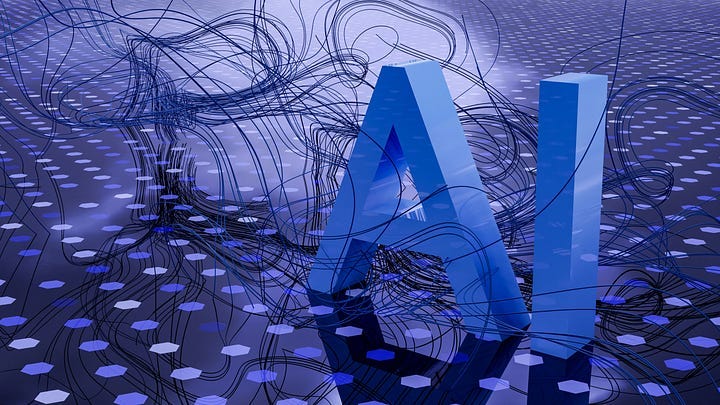AI by 2025: What Ex-Google CEO Revealed
How AI agents, infinite memory & self-improving systems could reshape your life + Free access to my video courses

Hello 👋
I’m Rakia, a freelance senior software engineer, Google Developer Expert (GDE) in Angular, speaker, and content creator.
In today’s roundup, I dig into the AI future that’s about to upend how we work, play, and interact with the world. Former Google CEO Eric Schmidt has been dropping some jaw-dropping predictions about it.
Whether you're a developer, an engineer, or just someone who loves tech, this will hit close to home. Let’s get right into it!
AI Agents: The Taskmasters You Didn’t Know You Needed
Unlike assistants like Siri or Alexa, which cloud set a timer or play your favorite playlist, AI agents will be able to handle complex tasks, like managing your schedule, booking a last-minute vacation, or even handling niche work like preparing a 10-page research summary.
Think about it: You could say, “Plan a three-day conference for 150 people in San Francisco,” and the AI agent will not only find venues but also handle catering, send invites, and manage RSVPs.
OpenAI’s ChatGPT and Microsoft’s Copilot tools are already scratching the surface of this. Microsoft 365 Copilot is showing how AI can draft emails, prepare presentations, and even summarize entire threads of communication. By 2025, this level of automation will be the norm, not the exception.
Infinite Memory: AI That Never Forgets
Let’s face it—keeping track of every detail is hard, especially when you’re juggling projects, meetings, and personal commitments. Schmidt believes AI systems will soon remember everything you need, from the intricacies of your codebase to which brand of coffee you like the most.
For software developers, this means you’ll no longer need to spend hours digging through old repositories or documentation. Your AI will have context about every line of code you’ve ever written and will help you debug or build faster.
Anthropic’s Claude AI is already showing promise with extended “memory” for conversations, enabling context retention over thousands of words. This is just the beginning—by 2025, you might have an AI collaborator that remembers how you like to work and proactively assists you.
Why this matters?
Infinite memory will change personal and professional lives:
Need a recap of a six-month-old project meeting? Your AI has it.
Want a tailored fitness or financial plan based on years of your habits? Done.
Big Impacts Across Industries
Schmidt doesn’t just predict changes—he sees AI revolutionizing nearly every field.
Workplace Collaboration
Teams will work more efficiently with AI to keep track of long-term projects and ensure that no one misses important updates.
Example: Think of a tool like Slack, but with an AI that automatically generates summaries of team discussions and tracks unresolved tasks.
Healthcare Innovations
AI could analyze mountains of medical data to identify trends and recommend treatments.
Example: Google’s DeepMind already helped predict protein structures, which paves the way for advancements in medicine.
Cybersecurity & National Security
AI will detect and respond to cyber threats faster than humans ever could. It could also help nations anticipate global crises, from pandemics to supply chain disruptions.
Personalized AI Assistants
Your AI assistant could evolve with you. From offering career advice to helping you pick a recipe for dinner, these systems will feel more like partners than tools.
Fun Tidbit: Schmidt mentioned that if TikTok gets banned, AI could create a personalized clone in seconds. That’s how fast things are moving!
The Self-Improving AI: Are We Ready for This?
Here’s where things get a bit sci-fi. Schmidt warns about the rise of self-improving AI. These systems will learn from themselves, getting smarter without human intervention. While this sounds cool, it also raises questions about control and ethics.
Why it’s scary?
If AI becomes better than humans at nearly everything, what happens to jobs, creativity, or even decision-making?
Schmidt points out that society isn’t ready for this kind of rapid change. And honestly, can you blame him?
What to watch for?
Expect debates around AI regulations to heat up. Companies like OpenAI and DeepMind are already calling for responsible AI development, but enforcement is another challenge altogether.
How to Prepare for this AI-Driven Future?
Stay Curious: Keep learning about AI tools that can improve your workflow. Whether it’s GitHub Copilot, ChatGPT, or industry-specific AI, staying informed will give you a leg up.
Focus on Creativity: AI might automate tasks, but your unique creativity and problem-solving skills will always be valuable, especially for complex cases.
Advocate for Responsible AI: Join discussions about ethical AI use in your field. Your input as a developer or engineer matters.
The Big Takeaway
AI isn’t just a buzzword—it’s an unstoppable force. By 2025, AI agents will handle your to-do list, infinite memory systems will supercharge your productivity, and self-improving AI might even outsmart you.
But here’s the good news: If you embrace the changes and leverage them, you’ll be in a prime position to thrive.
So, let’s keep an eye on this AI revolution together.
🎁 Special Gift for You
I’ve got a couple of great offers to help you go even deeper. Discount & free access to my video courses - available for a limited time, so don’t wait too long!
FREE access
⚡ Master Web Performance: From Novice to Expert
Use coupon 3C77646FD774D2408453🐳 Getting Started with Docker & Kubernetes + Hands-On
Use coupon 21C53797DB629B73288E
Discount
🔥 Modern Software Engineering: Architecture, Cloud & Security
Use coupon B23FA85253A6E0CD0FB0
Until next time—stay curious and keep building!
Best,
Rakia
💡 🧠 I share content about engineering, technology, and leadership for a community of smart, curious people. For more insights and tech updates, join my newsletter and subscribe to my YouTube channel.



